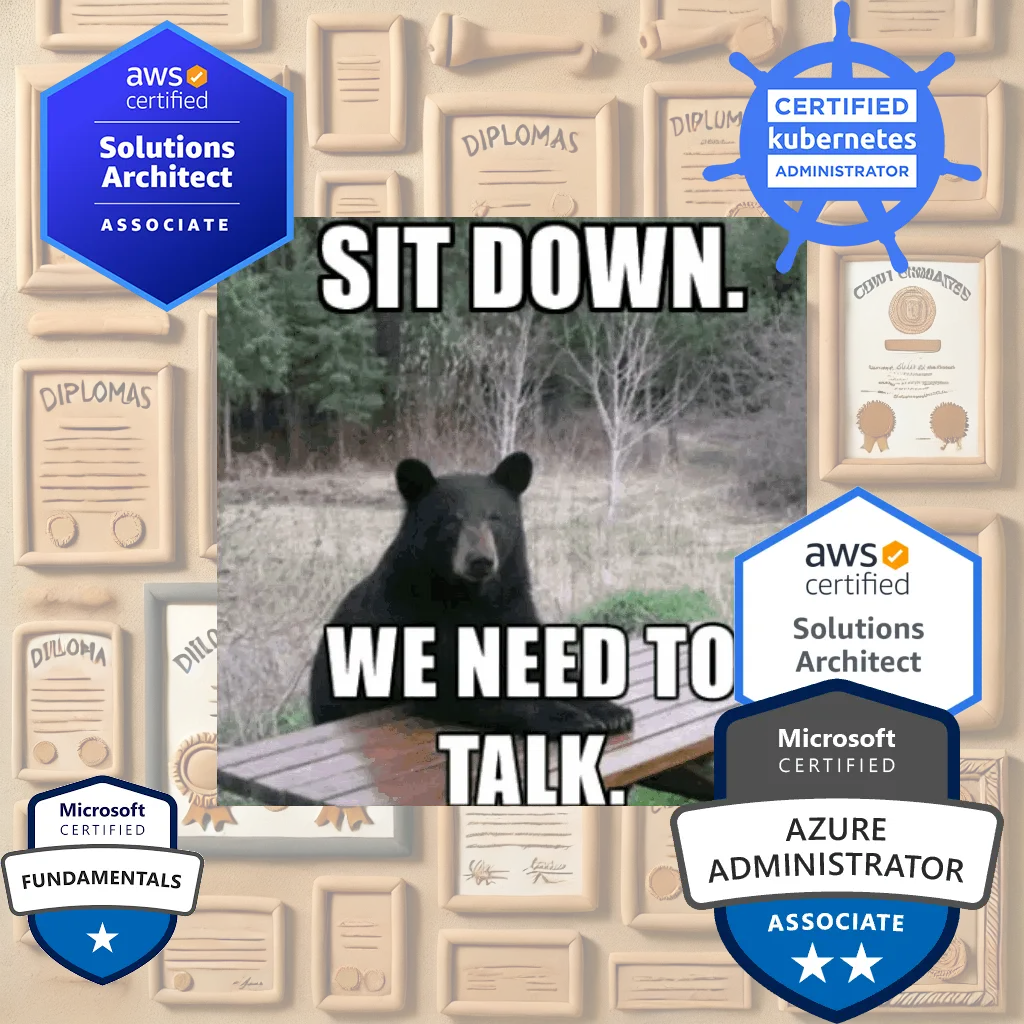I touched on this previously in a rant nobody saw on twitter/x
I am all in on the idea of learning new technology and getting certified in it to get started in a new role. I was there with you. I spent two years in online communities getting advice from senior people who, in hindsight, had some nuggets of wisdom but ultimately steered me wrong. There is a prevailing mentality of "If I suffered, so should you" in tech that just befuddles me. Why should I take a 50% salary cut to get a help desk role when I have been working with the technology for years albeit in a different role? For me specifically, sales.
Why should I be ashamed of scoring a job that normally requires more seniority if:
- I am qualified
- I interview very well
- I was able to show my proficiency in creative ways
Should I be ashamed because I didn't go through the trenches? Forget that. And you shouldn't either.
Now with that being said, I believe we have to establish some ground rules, because it is important to preserve or uplift the credentials we all work so hard to obtain....and yes that even means the "mUltIPle cHOicE qUiz bASed oNes" that those senior folk always dismiss.
Understand your desired role
First, too many people chase certifications without understanding the actual role. They want a badge, not the skills. Yes, gatekeeping in tech is real (REALLY REAL), but skipping fundamentals, especially open source technologies, is a huge mistake. The cloud runs on Linux—AWS, Docker, Kubernetes, networking, and cybersecurity. Thinking certs alone will carry you through is naive at best, and lazy at worst. You need Linux knowledge to troubleshoot and thrive. Don’t ignore what 96.3% of web servers run on. Why would I hire you if you can't work on most enterprise servers?
Let's understand that Cloud Engineer as a role in itself is being phased out, and being used more and more as a broad label, as it has evolved and branched out so much past that title. In it's place we now have these following roles popping up:
- Solutions Architect
- Infrastructure Engineer
- DevOps Engineer
- Site Reliability Engineer (SRE)
- Systems Administrator
- Infrastructure Security Engineer
- (Insert vendor) Network Engineer
- Platform Automation Engineer
- Platform Engineer
- and much more
...So it's important that before you go ahead and give Bezos and Gates your hard earned money for a shiny Credly badge, that you know which of these roles align best with your desired career choices, and most importantly, what do these roles do on a day-to-day. Because the cloud is so vast, that it's best practice to divide the responsibilities and duties to specialized roles.
This field is highly competitive, and I recognize that finding reliable guidance and mentors can be challenging. However, it’s concerning to see so many people pursuing certifications without researching or fully understanding the roles they’re aiming for. They just want the badge and expect to be hired. Let me emphasize this: gatekeeping in tech is a genuine cultural problem, and it makes breaking into the industry tougher. But what’s especially frustrating is when seasoned professionals, often with 15+ years of experience, dismiss certifications as “worthless” because they existed before many of them. Discouraging others from getting certified is not only entitled but also mean-spirited and dishonest. So our job is to disprove them.

Understand the skills your desired role requires
Second, there’s a baffling notion on online certification communities that you don’t need Linux knowledge to be a capable cloud engineer. Some think they can stack certifications without learning the basics, but here’s the truth: if you don’t know Linux, you’re setting yourself up for failure in cloud engineering. The cloud, whether AWS, GCP, or Azure, runs on Linux. Most VMs are Linux-based because it’s cost-efficient. Sure, you can use a Windows server, but Linux clearly dominates the cloud.
What’s your plan when something inevitably goes wrong in these Linux-based environments? Are you banking on everything working perfectly without needing troubleshooting? Do you think your job stops at spinning up the VM itself? Are you NEVER going to use the cloud shell? Good luck with that. And then there’s Docker and Kubernetes—both critical to modern cloud infrastructures, and both reliant on Linux. Docker uses Linux kernel features like cgroups and namespaces, and Kubernetes runs best on Linux. Without understanding Linux, you won’t know what’s happening behind the scenes. And when things break, you’ll be lost.
Networking? That’s Linux, too. While Cisco has IOS, Linux is everywhere in networking. Network engineers regularly use Linux command-line tools like tcpdump and iptables. Plus, most web servers—like Nginx and Apache—that power the internet run on Linux. Skipping Linux in networking is like driving without steering. Even in cybersecurity, Linux rules the space. Most servers, supercomputers, and penetration-testing tools are Linux-based. How do you plan to run security tests or fix vulnerabilities if you don’t understand Linux? Yet I’ve seen cybersecurity students shy away from it. I know who I don't want overseeing my infra's security.

Maybe some think certifications alone will suffice, but they’re missing out on the core skills every real engineer needs. Cloud infrastructure and tech as a whole are built on Linux. Ignoring it because it’s “hard” or thinking certs alone will cut it is just lazy. You might scrape by as a “cloud engineer” without Linux, but when something breaks or you need to fix a container or network issue, you’ll be in serious trouble. Furthermore, how are you going to answer "How good is your Linux" on an interview? With a shy smirk? But there's more, like Terraform, Ansible, ArgoCD, Loki, Grafana, Prometheus, Cillium, Istio and Git. These are all cloud technologies that will 1000% be vital to wherever you decide you work. Getting to know these thoroughly is something that won't be covered by racking up AWS certs. Understand the important of Open Source.
Skip the rookie stuff
Third, unless you get a free voucher or steep discount, skip the AZ-900 or AWS-CCP. These introductory certs won’t help you land a job unless you're in a sales or sales-adjacent role that requires basic Azure/AWS knowledge. Instead, aim higher from the start and dive deeper into your learning. Most employers or clients are using Serverless, Containers, and Kubernetes, and not knowing those could be the dealbreaker between you and someone with a CKA/KCNA and/or RHCSA/LFCA on their resume, Best believe that. If you want a introductory cert to learn cloud basics, I suggest Oracle's OCI Foundations....it's free and covers most of the same topics as AWS & CCP....just swap out some service names but its like a 60% overlay. Plus their free tier is the most generous for you to truly play with security groups, subnets, IAM, RBAC, VPCs, Kubernetes, Container registries and more. From there, sign up for free tiers on the big three and go for more than foundations level. Everything covered on the basic certifications will also be covered on the role-based certification. If you are looking for a technical role, aim higher out the gate. Period.
Show and prove, and network too
Fourth, networking and visibility are important. Like REALLY important. What does this mean? What projects have you created that you can talk about or show on Git? What have you journaled in your blog either as a tutorial or as an experience you shared. Also, have you met fellow Engineers, who are well established? Have you attended conferences? How many online communities are you apart of? If you are looking for a mentor in this field, they too will want to see you are proactive in learning and putting into practice what you have learned. Having certifications alone will never replace this. Chronicle your projects, try the resume challenges, add some layers to it. Contribute to open source projects if you want/can. Do some tutorials on youtube. Self host your own site, and over engineer the crap out of it. Show that to a potential mentor online or at a conference, and it'll show them you aren't going to be a waste of time. As far as conferences, if you don't have the funds to make it to one, apply for their scholarships, many of them have these programs available for students and newbies. If all else fails, many offer the online component free of charge, I really encourage this as you will learn something that will stick with you and teach you something that you will use on your day-to-day. Some conferences to consider in the cloud field are: AWS re:invent, Google Cloud Next, Kubecon + Cloudnativecon, Microsoft Ignite, Hashiconf, Oracle Cloud World, VeeamOn. Also go on Meetup and check for local events, as the CNCF, Google Cloud & AWS regularly hold smaller community based events you can attend, that are much more affordable than the big conferences.
Invest in you, and not just the vendor
Fifth, don't put all your eggs in one vendor. Understand how to operate in a multi-cloud environment. That doesn't mean get certified in a ton of vendors, just know and demonstrate you know how make different cloud services across vendors talk to each other. Any enterprise worth their weight has some level of multi-cloud deployments going on to save on cost or regulations. Is it really worth it to get the newest AWS or Azure certification just because it's dirt cheap, but you realistically won't apply any of it in your professional career (looking at you, Machine Learning), or would you rather learn how thousands of companies use AWS in conjunction with another provider? If you're going to collect certifications, which ones are going to add more value to you in the job marketplace as compared to a single vendor?
Take a deep breath. You're fine.
Finally, do not get discouraged, but readjust your path. Understand this isn't easy and it's competitive. Understand how important cloud-agnostic tools are. Learn Linux even if it scares the bejeezus out of you. Same with all (or most) of the technologies I mentioned in this piece. Also, to the online senior devs....I love you all and appreciate what you have done for the community and the field, but we could all improve our "soft skills", even when interacting online, so I hope you're not too mad. I mean this only applies to the gatekeeping type anyway, so........
P.S. If you use exam dumps...you suck.







